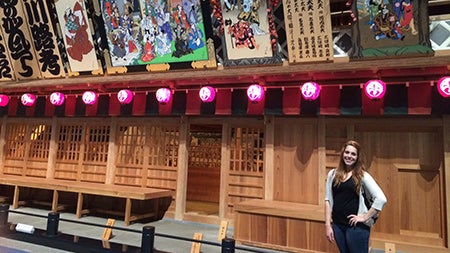For Undergrad Carly O’Connor, a Research Trip to Japan was Life Changing

Carly O’Connor straps on a helmet and swings a leg over her cycle, a sporty little red Aprilia. A self-proclaimed biker—complete with three tattoos, and more to come, she promises—O’Connor bikes all over the tri-state area (PA, WV, OH) with her family on weekends.
Yet, she is no ordinary biker chick; O’Connor speaks Japanese, knows her way around a cell biology research lab, and plans to enter medical school after she graduates from the University of Pittsburgh in Spring 2016.
A student in the University Honors College, O’Connor is double majoring in neuroscience and Japanese, minoring in chemistry, and will earn a certificate in Asian Studies from the Dietrich School of Arts and Sciences. She has twice been awarded the University’s Brackenridge Research Fellowship—first in Fall 2013, studying the effects of unpredictable, chronic, mild stress on adolescent rats; then, in Summer 2014, when she helped research the interaction that mediates the transport of dopamine in the brain in response to amphetamine. Both efforts yielded exciting results: The latter promises a potential pharmacological target to treat meth addiction, while the former, interestingly enough, demonstrated the exact opposite of the researchers’ predictions, showing the brain to be in a particular state of resilience during adolescence.
Born and raised in Pittsburgh, O’Connor was not initially sold on attending college in her hometown. “My parents were always pushing me to go to Pitt, so naturally, I was completely against it,” she recalls.
She warmed up to the University, though, thanks to the appeal of the Honors College and the ability to combine her eclectic interests in neuroscience (pre-med track) and Japanese within the Dietrich School.
O’Connor has not regretted her choice for a moment. “My favorite aspect of Pitt is the feel of a small school on a big campus,” she says. “It’s so nice to have class with a group of people that feel like family. When I walk down the street, I always see someone I know.”
While she is not sure exactly how her future medical career will mesh with her interests in Japanese language and culture, O’Connor is grateful for the connections she has made so far and is open to seeing how these two areas play out.
“So far, every time I think about dropping Japanese, it makes a reappearance as being central in my life,” she says.
Last summer, O’Connor saw firsthand how she could combine her two majors, winning an Amgen scholarship at the University of Tokyo. There she conducted eight weeks of research in a fertility lab, studying the eggs that nest and surround the egg cell, learning how they develop and what role they play in maintaining the egg cell.
“I learned so much about myself as a researcher, while also developing my skills in cell biology and Japanese,” says O’Connor. “And, I began to appreciate the social implications of research in women’s health, which has been historically largely ignored. Before going to Japan, I didn’t know what assistive reproductive technology was or how it worked. I didn’t learn about it in class, and I couldn’t believe that such an important topic was ignored.”
But the injustice O’Connor saw in academia, where female health issues were often overlooked in favor of male subjects and male-centered problems, paled in comparison to what she witnessed volunteering at Planned Parenthood.
“I worked in the recovery room and at the front desk, and I also used to escort patients to the front door. I was immediately shocked by the violence surrounding the clinic—not physical violence, per se, but the verbal assaults hurled at me, my fellow volunteers, the employees, and, of course, the patients.”
O’Connor says these attacks came not just from protestors outside the clinic but also from the government, in the form of restrictions on women’s health care.
It is an experience that has helped shape who she is, and also, who she hopes to become.
“I’ve learned that I’m braver than I thought I was,” she says. “Traveling to Japan and using the language every day, as well as volunteering in reproductive health, I’ve been pushed beyond my comfort zone. I’ve learned different interpretations of ‘doing the right thing,’ and I’ve used my own sense of direction to guide me. This has helped me in every imaginable situation.”
Return to Snapshot
